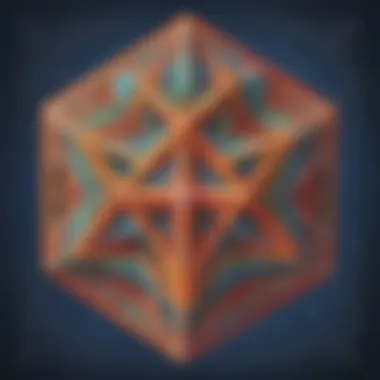Engage Young Minds with Fascinating Mathematical Trivia


Explanation Activities
In this segment, we will delve into creative activities that engage young minds in the realm of mathematics. The primary focus is to provide craft ideas that are easily replicable by children aged 5 to 12. These craft ideas aim to make learning numbers and patterns enjoyable and hands-on. Step-by-step guides will be included for each activity, ensuring that children can follow along effortlessly. Moreover, the educational value of these activities will be discussed, emphasizing how they can enhance children's understanding of mathematical concepts through practical engagement.
Fun Quizzes
Moving on to the Fun Quizzes section, we will explore the diverse range of topics covered in the quizzes available on ElemFun. These quizzes are designed to stimulate young minds and reinforce their knowledge of mathematics. Various question types will be explained to showcase the interactive nature of the quizzes, keeping children engaged and entertained while learning. Additionally, we will highlight how these quizzes play a crucial role in reinforcing learning, making the educational journey exciting and rewarding for children.
Fact-Based Articles
Lastly, we will focus on Fact-Based Articles that cater to young learners eager to expand their mathematical knowledge. These articles cover an array of engaging topics presented in an easy-to-understand manner. The content is designed to pique children's curiosity and promote a deeper understanding of mathematical concepts. To further enrich the learning experience, additional resources will be provided, offering children avenues for further exploration and discovery in the vast landscape of mathematics.
Introduction to Mathematical Trivia
As we embark on this thrilling journey through the realm of mathematical trivia, it is essential to understand the profound significance it holds for young curious minds. Introducing children to mathematical trivia not only sparks their interest in numbers but also fosters critical thinking skills and problem-solving abilities at a young age. By engaging with mathematical trivia, kids can enhance their mathematical knowledge in a fun and interactive manner, laying a solid foundation for future academic pursuits.
What is Mathematical Trivia?
Mathematical trivia encompasses a wide array of interesting and puzzling facts and concepts within the realm of mathematics. From captivating number patterns to intriguing mathematical constants, mathematical trivia aims to stimulate curiosity and inspire exploration of the various wonders hidden within the world of numbers. These trivia elements not only entertain but also educate young minds, fostering a deeper appreciation for the beauty and complexity of mathematics.


Significance of Mathematical Trivia for Young Minds
The significance of mathematical trivia for young minds lies in its ability to make learning mathematics a fun and engaging experience. By introducing mathematical trivia to children, educators can ignite a passion for numbers, leading to increased interest and confidence in mathematical problem-solving. Moreover, mathematical trivia enhances cognitive skills such as critical thinking, pattern recognition, and logical reasoning, contributing to overall cognitive development in children.
Why Encourage Kids to Explore Mathematical Trivia?
Encouraging kids to explore mathematical trivia is pivotal in nurturing a love for learning and mathematical exploration from a young age. By delving into mathematical trivia, children can develop a deeper understanding of mathematical concepts in a playful and interactive manner. Furthermore, exploring mathematical trivia can boost problem-solving skills, creativity, and mathematical intuition, equipping young minds with the tools they need to excel in the world of numbers and beyond.
Number Patterns That Mesmerize
Fascinating Fibonacci Sequence
Within the realm of mathematical trivia, the Fibonacci sequence stands out as a mesmerizing pattern that recurs throughout nature and art. Originating from a simple sum series, this sequence unfolds with each number being the sum of the two preceding ones (0, 1, 1, 2, 3, 5, 8, etc.). This sequence showcases the essence of growth, spirals, and proportions found in elements like seashells, sunflowers, and galaxies. Introducing children to the Fibonacci sequence not only cultivates numerical fluency but also instills a sense of interconnectedness between mathematics and the natural world.
Exploring Prime Numbers
Prime numbers, those indivisible except by themselves and one, present a fascinating puzzle within the realm of mathematics. By delving into the world of prime numbers, young learners can uncover the intricacies of these unique numerical entities and their significance in encryption, algorithms, and patterns. Exploring prime numbers offers a gateway to logical reasoning, problem-solving, and mathematical discovery. Through interactive activities and visualizations, children can develop a keen eye for recognizing prime numbers and understanding their role in the mathematical landscape.
Magic of Pascal's Triangle


Pascal's triangle, a wondrous geometric arrangement of numbers, unveils a multitude of mathematical secrets waiting to be explored. This triangular array demonstrates various mathematical properties and patterns, including binomial coefficients and the Fibonacci sequence. Through Pascal's triangle, children can witness the elegance and symmetry of mathematical structures, fostering a deeper understanding of algebraic concepts and probability theory. Engaging with Pascal's triangle not only stimulates intellectual curiosity but also reinforces the connections between different branches of mathematics and real-world phenomena.
Mind-Boggling Concepts in Mathematics
Infinity and Beyond
Within the vast landscape of mathematical knowledge lies the enigmatic concept of Infinity and Beyond. Infinity presents a perplexing idea that goes beyond traditional numbers, leading to thought-provoking discussions on unboundedness and limitless quantities in mathematics. Understanding infinity introduces young minds to abstract thinking, encouraging them to explore beyond conventional arithmetic and grasp the infinite nature of numbers. This concept lays the groundwork for exploring higher-level mathematics and fosters a deeper appreciation for the boundless possibilities within the mathematical realm.
The Enigma of Pi (π)
Another fascinating topic within mathematical trivia is the Enigma of Pi (π). Pi, an irrational number representing the ratio of a circle's circumference to its diameter, captivates young learners with its infinite and non-repeating decimal expansion. Delving into the world of Pi not only introduces students to the concept of irrational numbers but also highlights the mathematical elegance and precision involved in calculating quantities related to circles and spheres. Understanding Pi provides a gateway to geometry and trigonometry, showcasing the interconnectedness of different mathematical disciplines through this enigmatic yet fundamental constant.
Diving into Fractals
Lastly, we immerse ourselves in the mesmerizing realm of Fractals, intricate geometric shapes that exhibit self-similarity at different scales. Delving into Fractals introduces young minds to the beauty of geometric patterns found in nature and art, fostering creativity and visual-spatial reasoning. Exploring Fractals encourages children to appreciate the harmony between mathematics and aesthetics, showcasing the interconnectedness of mathematics with real-world patterns and structures. Through Fractals, young learners embark on a visual journey into the fascinating world of mathematical artistry and complexity, igniting a passion for exploration and discovery.
Historical Figures and Their Mathematical Contributions
In this significant section of the article dedicated to exploring mathematical trivia for young minds, we delve into the intricate world of historical figures and their impactful contributions to the field of mathematics. Notably, understanding the legacy and innovations of these renowned individuals provides a solid foundation for young learners to appreciate the evolution and relevance of mathematical concepts in today's world. By highlighting the accomplishments and thinking processes of these historical figures, children can gain insight into the development of mathematical principles and problem-solving strategies.


Pythagoras: Father of Geometry
Pythagoras, a legendary figure known as the Father of Geometry, revolutionized the understanding of shapes and spatial relationships. His famous Pythagorean theorem remains a fundamental principle in mathematics, illustrating the relationship between the sides of a right triangle. By exploring Pythagoras' geometric contributions, young minds can grasp the practical applications of geometry in everyday life, from calculating distances to analyzing angles in various shapes. Understanding Pythagoras' theorem not only enhances mathematical reasoning but also nurtures logical thinking and problem-solving skills in children.
Ada Lovelace: Pioneer in Computer Science
Ada Lovelace, a visionary pioneer in computer science, made groundbreaking advancements in the realm of technology and programming. As the world's first computer programmer, Lovelace laid the foundation for modern computing by conceptualizing complex algorithms and realizing the potential for machines to perform various tasks. Introducing young learners to Lovelace's innovative work inspires curiosity about the possibilities of technology and encourages exploration of coding and computational thinking. By discovering Lovelace's contributions, children can envision themselves as future innovators in the digital age, sparking an interest in STEM fields and creative problem-solving.
Archimedes: Master of Calculus
Archimedes, hailed as the Master of Calculus, contributed significantly to the fields of mathematics and physics through his profound discoveries and inventions. His pioneering work in calculus and geometry laid the groundwork for understanding concepts such as area, volume, and the principle of buoyancy. By unraveling Archimedes' mathematical achievements, young minds can grasp the practical applications of calculus in measuring shapes and analyzing phenomena in the physical world. Exploring Archimedes' methodologies and problem-solving approaches instills a sense of inquiry and critical thinking in children, fostering a deeper appreciation for the wonders of mathematics and its real-world implications.
Interactive Mathematical Quizzes for Kids
Exploring mathematical trivia through interactive mathematical quizzes is paramount to stimulating young minds and fostering a love for numbers. These quizzes serve as more than just a form of entertainment; they are educational tools that promote critical thinking and problem-solving skills in children aged 5 to 12. By engaging with these quizzes, kids not only enhance their mathematical knowledge but also develop essential cognitive abilities that are valuable for their academic growth.
Test Your Knowledge: Math Quiz Time!
Test Your Knowledge: Math Quiz Time! provides an exciting platform for children to challenge themselves and apply their mathematical understanding in a fun and engaging way. From basic arithmetic to more complex concepts, this quiz encourages kids to think logically and strategically while honing their number skills. With each question posed, young learners have the opportunity to put their math knowledge to the test, reinforcing their comprehension and confidence in tackling mathematical problems.
Fun and Educational Quizzes to Engage Young Minds
Fun and Educational Quizzes to Engage Young Minds offer a delightful blend of learning and entertainment, making mathematics less intimidating and more enjoyable for kids. Through a variety of engaging activities and questions, these quizzes not only reinforce mathematical concepts but also instill a sense of curiosity and wonder in young minds. By presenting math in a playful and interactive manner, children are motivated to explore mathematical trivia further, creating a positive and enriching learning experience.
Inspiring Curiosity Through Interactive Learning
Inspiring Curiosity Through Interactive Learning is a key component in nurturing a child's inquisitive nature and fostering a deep interest in mathematics. By encouraging interactive participation and exploration, children are more likely to develop a lifelong passion for numbers and problem-solving. Through hands-on activities and engaging challenges, interactive learning cultivates a sense of wonder and growth mindset in young learners, empowering them to approach mathematical concepts with enthusiasm and confidence.







